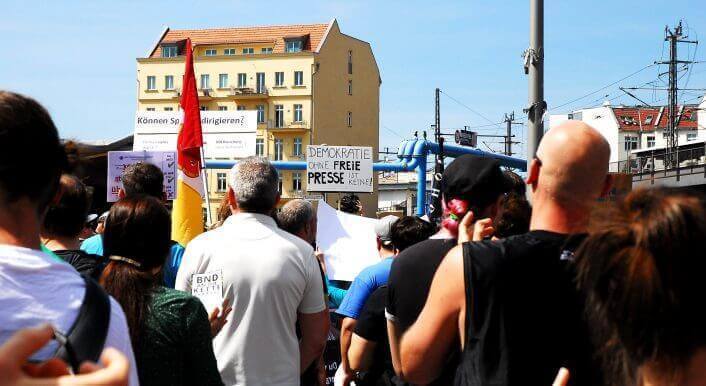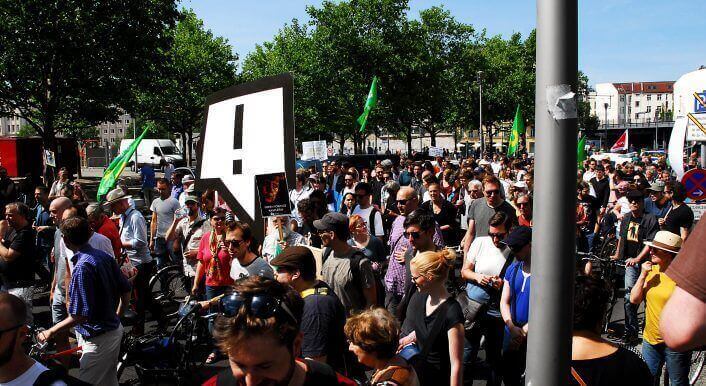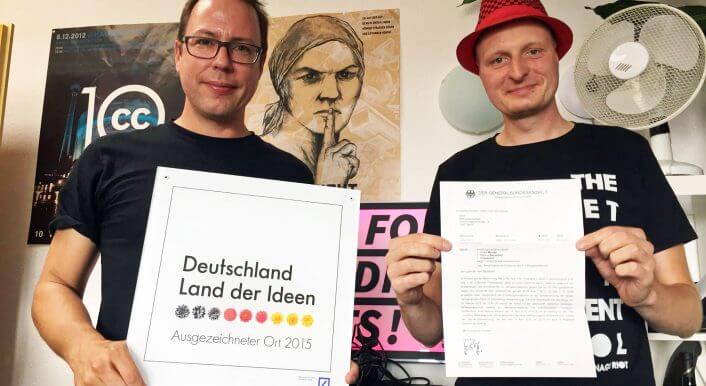Falling on Deaf Ears
In its fight against corruption, Transparency International has long called for better protection of private sector employees and government officials who blow the whistle on mismanagement and corruption. But only recently Transparency International learned firsthand the difference between theory and practise in the protection of whistleblowers.

Whistleblowers play an important role in the fight against corruption because bribery occurs in a shady world away from public scrutiny. When bags stashed with cash change hands or slush funds are channelled through chains of shell companies registered in tax-havens: one of the few opportunities to uncover corruption may be a leak from the inside of a company or a government office.
This is why whistleblowers are important to Transparency International (TI). Founded in Berlin in 1993, the non-government organisation is at the forefront of the global fight against corruption. TI lobbies governments to improve legal protection for people who disclose secrets in the public interest.
Isolated
But a former TI employee tells a story that casts doubt on the organisation’s own whistleblower efforts. Anna Buzzoni says she and some of her colleagues wanted to blow the whistle on questionable practices within TI, but her report fell on deaf ears. The internal review and its results were not transparent to the whistleblowers, she said. In the end, Buzzoni and others whistleblowers left the organisation in frustration. „I felt isolated“, she recalls. TI denies its organisation lacks whistleblower protection, although it confirmed some of the internal issues.
Buzzoni’s interest in the fight against corruption and organised crime dates back to the early 1990s. „The Italian mafia carried out some assassinations that also killed innocents“, remembers Buzzoni, an Italian national who lives in Berlin. „That’s why TI was on my radar from the early 2000s.“
An empty shell
In 2006, after discussions with partner organisations, TI founded the Water Integrity Network (WIN) to improve transparency in the water sector. Clean water is a fundamental need and corruption and mismanagement in the water sector have a direct impact on the population worldwide. WIN initially was not established as a separate legal entity but instead was part of TI’s Berlin-based secretariat, functioning as one of the organisation’s programs. The allegations entirely fall within the time when WIN was still part of TI. WIN today is an independent organisation.
In 2012, a TI manager proposed registering WIN in the Netherlands in order to make the project eligible for funding from the Dutch government. Any organisation that already receives funding from the Dutch government for its core operations – as was the case with TI – can not receive additional project funds intended for one of its programs. The funding was therefore supposed to flow through a foundation in the Netherlands, an empty shell specifically created for this purpose. Unfortunately the structure resembled shell companies, that are often favored by money launderers to cover their tracks.
Transparency concerns
A foundation was established in the Netherlands in September 2012, in a hasty and ill-planned manner, documents reviewed by CORRECTIV show. The problem was quickly identified by TI’s legal department, which warned that this foundation structure could put TI’s non-profit status in Germany at risk. But the TI executive as well as some members of WIN’s international steering committee continued their efforts to establish WIN as a Dutch foundation. WIN was no longer to be just a post-box company in the Netherlands but to completely move its offices there. To move things along, the manager began negotiating for office space.
Some of WIN’s donors – which included the government of Germany, the Netherlands and Switzerland – preferred to preserve the close association between WIN and TI. They felt presented with a fait accompli and were concerned about the lack of transparency. In June 2013, the steering committee, under pressure from some donors – including the German ministry for economic cooperation and development – decided to suspend the efforts to establish WIN in the Netherlands and instead create an association in Germany.
Cash problems
This put WIN in a precarious position. The organisation had spent about a year on establishing itself as its own legal entity, instead of focusing on its mandate. Late in 2012, WIN risked running out of money as the Dutch government funds did not come through as anticipated, documents show.
In fall 2012, some of WIN’s employees, who were formally employed by TI, had had enough. They wrote a whistleblower report to TI’s ethics committee seeking a formal avenue for resolving these problems. Their purpose was to put an end to what they saw as mismanagement. In their view, the row over the future legal form of WIN had paralysed the organisation’s work.
The whistleblowers also accused the TI manager of blurring the lines between business and private interests. According to the allegations, the manager had tried to channel benefits – small sums – to his family. When WIN moved to a new office, the executive tried to award the transfer of the IT servers to his brother. TI’s legal department intervened. He also involved his wife during some TI events. An internal cost breakdown suggests that his wife billed 131.83 Euro for the use of brushes and paint. The document also points to a flight in her name.
A double life at TI
A unit that sets its own agenda, an executive who blurs the lines between business and private interests, unclear responsibilities and lack of accountability: these issues are nothing new in many companies and government offices. And there are specific guidelines how to deal with such issues – even if they do not involve the embezzlement of millions of euros.
TI’s top management, led by its secretary general Cobus de Swardt, in fact launched an internal investigation as you would expect from an organisation that has put transparency on its banner. “In the beginning, there was a lot of support, which for example expressed itself in praise for the accuracy of the report and our courage,“ says Anna Buzzoni. „But very quickly it also became clear that there was no protocol in place for whistleblower reports and things became very chaotic.“ Buzzoni describes a messy back and forth between the whistleblowers, the ethics committee, TI’s top management and its works councils. „I led a double life for two months and time and again had to sneak out of the office for meetings.“
Lack of clarity
TI declined requests by CORRECTIV to meet and discuss the allegations. In its responses to written questions, TI says that it provided the employees with an independent lawyer and that there were no repercussions for staff. All the issues were resolved in accordance with German labour laws, it says.
But TI also acknowledges deficiencies in the process. „We certainly recognise that there could have been greater clarity for staff on the processes and procedures to follow. These have been addressed.“ The organisation added in its statement that a lack of procedures did not result in a lack of whistleblower protection.
Anna Buzzoni disagrees. She says the investigation was led by TI’s top management, which violated TI’s own rules on conflicts of interest. According to those, internal investigations need to be conducted by the supervisory board or the ethics council. Suddenly the report was to be shown to the line manager of the executive in question. TI’s asked for the whistleblowers’ consent on short notice just when they were on a long-planned business trip abroad.
A flimsy pretext
“With hindsight, I had the feeling this was no coincidence. Again and again there was a reason for why the investigation never really started,“ says Buzzoni.
The investigation fizzled out after several weeks. According to Buzzoni, it was halted under the flimsy pretext of German labor law and data protection rules. TI said it had no access to the servers of WIN, which at that point had already been removed from TI’s offices.
Instead, the whistleblowers were asked to present formal grievances with TI’s human resources department, Buzzoni says. That would have disclosed their identity. Buzzoni says that the whistleblower report had only one tangible outcome: a „tough talk“ with the executive. Otherwise nothing changed. For example, in one later incident, the manager allegedly tried to claim expenses while on vacation. TI’s leadership played the incident down at the time, arguing there had been a data entry mistake.
Suspended duties
Transparency says that any inappropriate actions by the manager had been dealt with. It says the entity established in the Netherlands had been one out of three options, but the proposal was never operative and did not receive funding.
Buzzoni says that her efforts had consequences for herself. Two of her three project responsibilities were suspended during 2013. Both WIN’s small grants as well as its Latin America program were halted and she was left without some of her previous duties. At the beginning of 2014, her contract that was to expire in two months, was transferred from TI to the newly established WIN association in Germany. Buzzoni says that TI declined her request to keep her at the organisation.
The difficulty of protection
Buzzoni’s case serves as an example for many whistleblowers who weakened her opportunities by speaking out. Many put their career at stake. Companies have ways to wear employees down without firing them. Some whistleblowers have found themselves transferred to empty office wings, without phone and responsibilities. Isolated from their colleagues, until they resign. They can not find other work if their names are leaked to other employers in their industry. „Nevertheless, rather than being heard and praised for their courage, most whistleblowers face indifference or mistrust and their reports are not properly investigated,“ TI wrote in a 2009 report on whistleblower legislation in the European Union.
The senior executive, who was formerly responsible for WIN at TI, continues to work for WIN as a consultant. TI issued whistleblower guidelines for its secretariat in June 2014. They include the provision of an independent, external ombudsman whom whistleblowers can approach and who passes information to TI top management without disclosing the whistleblowers’ identity. There are also clear deadlines for the subsequent steps.
Just for Buzzoni and her colleagues, these guidelines came a few months too late.
Disclaimer added Sept. 1, 2015
Disclaimer: CORRECTIV executive director Christian Humborg worked as executive director of the German chapter of Transparency International until fall 2014. Anne Koch, member of the CORRECTIV ethics council has been regional director for Europe and Central Asia at Transparency International since 2011. Neither Christian Humborg nor Anne Koch had anything to do with this story.



